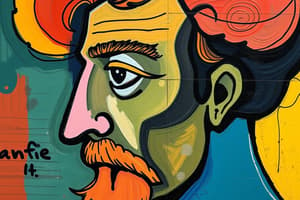Podcast
Questions and Answers
According to Aristotle's concept of hylomorphism, what is the relationship between the soul and the body?
According to Aristotle's concept of hylomorphism, what is the relationship between the soul and the body?
- The soul and body are two distinct substances that are temporarily united but can be separated at death.
- The body is the form that actualizes the potential of the soul's matter, making the human a rational being.
- The soul is the form that actualizes the potential of the body's matter, making the human a living being. (correct)
- The soul and body are separate entities that can exist independently of each other.
According to Aristotle, what are the three requirements for something to be considered a 'living being'?
According to Aristotle, what are the three requirements for something to be considered a 'living being'?
- Growth, reproduction, and sensation
- Growth, sensation, and rationality
- Growth, reproduction, and feeding (correct)
- Reproduction, feeding, and rationality
According to Aristotle's hierarchy of souls, which type of soul is capable of thinking and reasoning?
According to Aristotle's hierarchy of souls, which type of soul is capable of thinking and reasoning?
- Rational Soul (correct)
- Sensitive/Sentient Soul
- Vegetative Soul
- Spirited Soul
According to Rene Descartes' mind-body dualism, which component of the human person is considered the true self?
According to Rene Descartes' mind-body dualism, which component of the human person is considered the true self?
According to David Hume's perspective, what is the nature of the self?
According to David Hume's perspective, what is the nature of the self?
Which philosopher argued that the rational soul is the true self of the human person?
Which philosopher argued that the rational soul is the true self of the human person?
What did Rene Descartes believe was the superior component of the human person?
What did Rene Descartes believe was the superior component of the human person?
Which philosopher argued that the self is nothing but a bundle of impressions and ideas?
Which philosopher argued that the self is nothing but a bundle of impressions and ideas?
Which of the following is NOT one of the three requirements for something to be considered a 'living being' according to Aristotle?
Which of the following is NOT one of the three requirements for something to be considered a 'living being' according to Aristotle?
What did St. Augustine of Hippo believe was the supreme virtue that leads to understanding the self?
What did St. Augustine of Hippo believe was the supreme virtue that leads to understanding the self?
Study Notes
Philosophical Perspectives about the Self
- Philosophy is the study of the most basic and profound matters of human existence, derived from the Greek words "philo" (love) and "sophia" (wisdom).
Socrates (Ancient Greek)
- "The unexamined life is not worth living."
- The soul is the true self, responsible for knowing and acting rightly or wrongly.
- The soul is the intellectual and moral personality of humans.
- One should devote considerable attention, energy, and resources to making their soul as good and beautiful as possible, giving importance to acquiring knowledge, wisdom, and virtue.
Plato (Ancient Greek)
- The human person has two components: body (material and destructible) and soul (immaterial and indestructible).
- Soul-Body Dualism: the body cannot live without the soul, but the soul can live eternal even without the body.
- The soul has three parts: Appetite/Appetitive Soul (located in the abdomen), Spiritual/Spirited Soul (located in the chest), and Rational Soul (located in the head).
- The true self of the human person is the rational soul.
Aristotle (Ancient Greek)
- Hylomorphism: the metaphysical concept that all natural bodies consist of two principles, form and matter.
- The body cannot live without the soul and vice versa; the body is as important as the soul.
- All living beings have souls, which require the ability to grow, reproduce, and feed themselves.
- The human person is a rational animal, with three kinds of souls: rational, sensitive, and vegetative.
St. Augustine of Hippo (Medieval)
- Love for God is the supreme virtue and the key to real happiness, which leads to understanding the self.
Rene Descartes (Modern)
- The human person has two components: body (material and destructible) and mind (immaterial and indestructible).
- Mind-Body Dualism: the body cannot live without the mind, but the mind can live eternal even without the body.
- The true self of a human person is their mind, which makes them human.
- "I think, therefore I am": a thinking thing is a being that doubts, understands, asserts, denies, wills, imagines, and the like.
David Hume (Modern)
- "The self is nothing but a bundle of impressions and ideas."
- The self is not a concrete experience, but rather a collection of impressions and ideas that come from sensation and reflection.
Studying That Suits You
Use AI to generate personalized quizzes and flashcards to suit your learning preferences.
Description
Explore the origins and definition of philosophy as the love of wisdom. Learn about different philosophers and their perspectives on the self, such as Socrates with his famous quote 'The unexamined life is not worth living'. Dive into the study of the most fundamental aspects of human existence.




